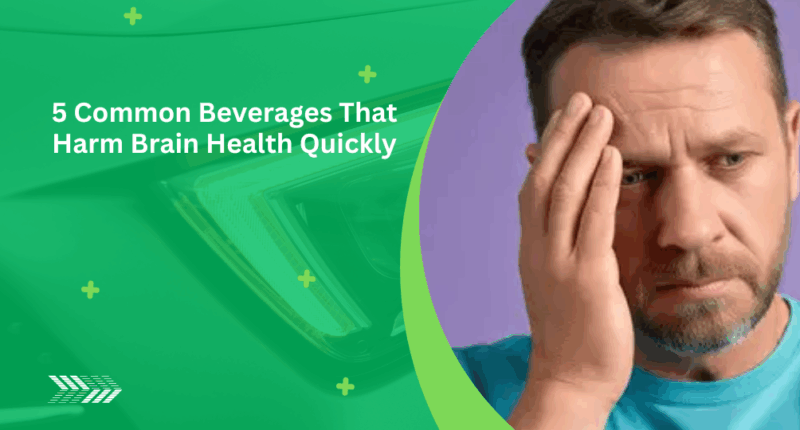- Sugary sodas contribute to brain inflammation and memory loss.
- Energy drinks’ caffeine and sugar combo stresses neural health.
- Excessive alcohol accelerates brain shrinkage and cognitive decline.
- Diet sodas may increase risks due to artificial sweeteners affecting the gut-brain axis.
- Sweetened coffee drinks’ sugar undermines coffee’s cognitive benefits.
Modern dietary habits include a variety of beverages that many people consume daily without much thought about their long-term effects. While hydration is essential for brain health, not all drinks contribute positively to cognitive function. Some beverages, when consumed regularly or in excess, have been linked to faster brain aging, affecting memory, focus, and overall mental acuity. This article highlights five such drinks and outlines how they may impact your brain, backed by relevant research and practical examples.

Sugary Sodas: The Sweet Culprit Behind Brain Decline
Sugary sodas are a staple in many households but come with hidden dangers for brain health. High sugar intake can lead to insulin resistance and inflammation, which negatively affect the brain’s hippocampus, the area responsible for memory and learning. Studies have demonstrated that regular consumption of sugary sodas is associated with poorer memory performance and smaller brain volume in middle-aged and older adults.
An illustrative example is a 2017 study published in Neurology, which found that people drinking one or more sugary sodas daily exhibited smaller hippocampal volume compared to those who rarely consumed them. This reduced volume correlates with cognitive impairments over time. Additionally, the rapid sugar spikes cause oxidative stress, further accelerating neural damage.
Also Read | How Women Over 50 Can Finally Lose Stubborn Lower Belly Fat for Good
Energy Drinks: Short-Term Boost but Long-Term Risks
The appeal of energy drinks lies in their immediate ability to enhance alertness and combat fatigue. However, these drinks, often loaded with high caffeine concentrations and sugar, can have adverse effects on the brain over time. Excessive caffeine intake disrupts sleep patterns, which are critical for brain cell repair and mental function.
Research indicates that chronic consumption of energy drinks may impair neuroplasticity, the brain’s ability to form and reorganize synaptic connections. A 2018 review in the Journal of Clinical Medicine highlighted that the combined effects of sugar and caffeine place the brain under stress, promoting inflammation and neuronal wear. Anecdotal accounts also reveal that users report memory lapses and decreased concentration after prolonged energy drink use.
Excessive Intake of Alcohol: A Well-Known Risk for Brain Aging
Alcohol’s impact on the brain is well-documented, especially with heavy or chronic use. Excessive drinking accelerates brain shrinkage, particularly in areas controlling decision-making, emotional regulation, and memory.
Neuroimaging studies from the National Institute on Alcohol Abuse and Alcoholism show that individuals consuming more than moderate alcohol amounts regularly have a significantly higher risk of cognitive decline and dementia. Even moderate drinking can cause subtle brain changes, especially when paired with other risk factors like aging or poor nutrition. The World Health Organization reports that alcohol-related brain damage affects millions worldwide, underscoring the importance of mindful consumption.
Diet Sodas: A Counterintuitive Threat to Cognitive Health
While marketed as a healthier alternative to sugary sodas, diet sodas contain artificial sweeteners such as aspartame and sucralose, which recent research suggests may contribute to cognitive decline. Studies link these sweeteners to altered gut microbiota, which plays a crucial role in brain function through the gut-brain axis.
Evidence from a 2016 study in Stroke revealed that habitual diet soda drinkers had almost three times the risk of stroke and dementia compared to non-drinkers. Though not yet fully understood, these findings caution against assuming diet drinks are harmless substitutes, especially for regular consumption.
Sweetened Coffee Drinks: The Hidden Sugar Trap
Coffee alone holds numerous benefits for cognitive health due to antioxidants and moderate caffeine levels supporting brain function. However, the growing trend of sweetened coffee beverages loaded with syrups, creams, and sugars may negate these benefits.
A typical flavored latte can contain upwards of 25 grams of sugar per serving, contributing to blood sugar spikes and inflammation. Over time, this pattern may lead to insulin resistance within brain cells, impairing memory and cognitive flexibility. For instance, habitual drinkers of sweetened coffee drinks report higher instances of brain fog and reduced mental clarity, suggesting the sugar content outweighs coffee’s positives.
Conclusion
Understanding how your beverage choices affect brain aging is crucial for maintaining long-term cognitive health. Sugary sodas, energy drinks, excessive alcohol, diet sodas, and sweetened coffee drinks all pose risks that can accelerate the decline of brain function if consumed frequently. Making informed choices by limiting or avoiding these drinks, while prioritizing hydration from healthier alternatives, can help preserve mental sharpness and memory with age.
Also Read | Dementia Prevention Made Easy: Top Neurologist’s 8 Proven Brain Health Strategies








